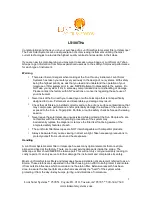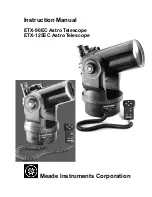
astro-tech
www.astronomytechnologies.com
from Astronomy Technologies, 680 24th Avenue SW, Norman, OK 73069
© 2008 by Astronomy Technologies
Specifications, features, and descriptions are effective 6/1/2008, but are subject to correction and/or modification without notice and/or obligation.
Your Astro-Tech AT102ED refractor is capable of a wide range of
astronomical viewing, simply by adding a star diagonal and eyepieces.
A 2” compression ring eyepiece holder on the focuser drawtube and
a separate 1.25” compression ring eyepiece adapter let you use either
1.25” or 2” star diagonals and eyepieces with no other adapter needed.
Astronomical Observing:
The theoretical maximum usable power
available from your AT102ED is 203x (using a 3.5mm eyepiece),
although higher powers are occasionally possible under exceptional
(and therefore exceptionally rare) seeing conditions. Keep in mind
that the seeing conditions play an important role in just how high a
magnification you can use on any given night. Only very good seeing
(clear skies and calm air) will support viewing at 200x and above.
Under less than ideal conditions, lower powers in the 120x to 140x
range provide more consistently usable and pleasing images.
To calculate the magnification of your telescope and eyepiece
combination, divide the telescope focal length in mm by the eyepiece
focal length in mm. For example, a 10mm eyepiece in your AT102ED
gives you a magnification of about 71x (709mm/10mm = 70.9).
The widest possible field of view with a 1.25” eyepiece is 2.4°,
which can be achieved with a 17.5x (40mm) Plössl eyepiece.
While your AT102ED has not been specifically designed for astro-
photography, it makes a very good wide-field astrograph for 35mm
and CCD imaging. A chrome tension/lock knob under the focuser
body lets you lock the tube in place for a sharp focus during
photography. You can also use the knob to increase the tension on
the focuser to hold very heavy 2” diagonal/eyepiece combinations
without slipping when aiming at the zenith.
The focuser can be rotated a full 360° for the best photographic
composition, or to put your diagonal in the most comfortable observing
position. To rotate the focuser, loosen the ribbed rotation locking collar
that encircles the barrel. Adjust the focuser to the desired angle, then
retighten the collar to secure the focuser at the new angle.
Terrestrial Observing:
Your AT102ED works well for daytime
birding, nature studies, etc. A good altazimuth mount or a very sturdy
photo tripod is essential, however, due to its 12 to 14 pound weight
when using a diagonal and eyepiece. Your scope is also a very good
709mm (14x) f/6.95 telephoto lens for terrestrial photography.
Generally speaking, the maximum usable daytime power with any
terrestrial scope is about 1x per mm of aperture (101x with a 7mm
eyepiece on your scope). Attempts to push the daytime power beyond
this point often magnify the heat waves, dust, and “mirage” in our
atmosphere to the point where the images become blurry and
unusable. A 28x (25mm) to 79x (9mm) eyepiece is usually more
satisfying for everyday high power terrestrial use than a 101x eyepiece.
Mounting the AT102ED:
A stable tripod, altazimuth mount, or
German equatorial astronomical mount is essential for best viewing.
The removable 8” long dovetail that is attached to your scope’s split
mounting rings has a 1/4”-20 thread hole for mounting on a suitably
very sturdy photo tripod. This Vixen-style dovetail is also sized and
shaped to mount directly in the dovetail slot on the top of an Astro-
Tech Voyager altazimuth mount; on a Celestron Advanced Series or
Meade LXD-75 go-to mount; or on a Vixen Porta altazimuth, Sphinx
go-to, or Great Polaris German equatorial mount.
Installing the Multiple Reticle Finder:
There are two holes for
mounting the finder, at the 10 o’clock and 2 o’clock positions on the
top of the focuser, 3/4” behind the focuser rotation locking collar. The
holes have screwdriver-slotted inserts to keep dust out of the scope.
Please carefully note the position of the finder mounting holes in the
illustration on the front page. There are also two hex-head inserts
immediately behind the finder mounting holes. Do not loosen these
hex-head inserts, as they are for factory adjustments of the focuser
mechanism only. Undoing them will void your warranty.
Choose on which side of the scope you want to mount your finder,
remove the appropriate slotted-head insert, and install your finder
bracket in the exposed hole per the separate finder instruction sheet.
Optional Astro-Tech Accessories:
Astro-Tech makes 1/10th wave
1.25” and 2” star diagonals with 46-layer 99% reflectivity dielectric
coatings to complement the performance of your AT102ED. These
are available from your Astro-Tech dealer to provide the highest
possible reflectivity and planetary contrast. An Astro-Tech 45° viewing
angle 1.25” image-erecting diagonal is also available for terrestrial
observing. The very stable Astro-Tech Voyager altazimuth mount with
slow motion controls is ideal for grab-and-go astronomy.
Caring for Your Scope Optics:
Never store your AT102ED in a
damp or humid environment. Avoid leaving it in a hot environment
(exposed to direct sunlight on a window sill, in a car trunk, etc.) If you
must store it in high humidity conditions, put a few packets of desiccant
(silica gel or the equivalent, available from most camera stores) in
with your scope to absorb excess moisture. If not properly stored in a
humid environment, the telescope may develop mildew which can
damage the optics.
If dew forms on your AT102ED after an observing session, allow
the scope optics to air dry at room temperature before putting the
lens cover on your scope and storing it away.
If the front lens surface becomes dusty, smeared, or shows
fingerprints or any other surface build-up, clean it as follows. First,
gently blow away any surface dust or particles with a clean air blower
(a child’s ear syringe or a photographer’s camel’s hair brush with
attached blower bulb, for example). Using canned or compressed air
is not recommended, as its propellant may spit out and leave difficult-
to-remove deposits on your lens. Also, the expanding compressed
air drops in temperature as it leaves the can. The cold air coming out
of the tiny tube used to direct the can’s air flow has been known to
chill a lens to the point of spalling chips of glass off the lens if pointed
at the same spot on the lens for too long.
Second, moisten a cloth with a few drops of a photographic-quality
optical cleaning solution designed for multicoated camera and
binocular lenses. A well-worn cotton handkerchief works well and
Zeiss and Kodak both make suitable fluids. Do not drip the cleaning
fluid directly onto the lens. Use the barely damp (not wet) cloth to
gently wipe the lens surface clean, turning the cloth frequently to
always keep a clean portion of the cloth in contact with the lens. Blot
the lens dry with a dry portion of the cleaning cloth or a separate
cloth. Start with a clean cloth each time cleaning is needed.
Avoid overcleaning your AT102ED. The multicoatings on the lens
are quite hard and durable. However, frequent overzealous cleaning
can scratch the coatings if all the dust particles (which are often tiny
flecks of windborne rock) are not removed before you start pushing a
damp cloth around your lens surface. A few specks of dust on the
lens will not be visible in your images. They are not in the focal plane
and don’t block enough light to measure, let alone be seen. Clean
your optics only when absolutely necessary. If you take proper care
of your scope, cleaning should rarely be needed.
Caring for Your Scope Finish:
Your AT102ED is finished in a
durable baked-on automotive-grade white paint with black anodized
components. The very durable finish can become smudged with
fingerprints during use, but this will not harm the finish. A clean soft
cloth slightly dampened with plain water (or a little moisture from
your breath and a quick wipe with a clean handkerchief) is generally
enough to remove fingerprints. Avoid harsh chemical cleaners or
organic solvents like benzene, alcohol, etc., as these may ruin the
finish. They can certainly affect the optical coatings if they accidentally
drip or splash on the objective lens.
Never use your telescope in the rain or in conditions where it may
get wet. Your telescope is not waterproof. If your scope accidentally
gets caught in the rain, immediately wipe off all water using a clean
and dry soft cloth. If your telescope gets totally soaked by water, or
submerged, immediately contact your dealer for service instructions.
Do not disassemble or attempt to repair your telescope yourself, as
this violates the terms of the limited product warranty and negates
any guarantee.
Caution! Never directly view the Sun with your telescope!
Never
aim your AT102ED at the Sun without having a professionally-
manufactured solar filter mounted over the objective lens. Viewing
the Sun through the scope without the proper protection for even a
moment may result in permanent severe damage to your eyes, and
can even cause blindness. Contact your Astro-Tech dealer if you are
interested in purchasing a compatible professional solar filter.














